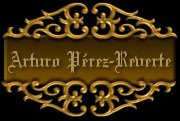
 |
 |
"We're writing the year 1868 in Madrid of Queen Isabella. A mysterious woman besets the old fencing master Jaime Astarloa. The beautiful unknown wears the finest clothes but her wrist is strong. What does she want to learn from him? How does she know that he masters an indefendable thrust ... a deadly thrust? Why does she want to wrench this knowledge from him?
The world of fencing and noble convictions is the world of the Don Jaime, a world in which one fights face to face, man against man, but times have changed. Where one shoots with pistols a fencing master is obsolete. But as Don Jaime, who is comfortable in the role of a deliberate spectator and who sees himself above all events is drawn into a murderous intrigue, he has to show once more in a fight for live and death that he is a man and he learns that he has been too haughty." (Translation of the German cover text)
An extremely exciting thriller, a story about power, revenge and political decisions which are marked by the end of an European era. Because of the appearance of Adela de Otero who besets Don Jaime to tell him his secret of the indefensible thrust everything changes for him for one last time. Suddenly he's in the middle of a fight between live and death and he must use all his abilities to parry an intrigue which threatens to shatter a whole nation in its foundations. What is it that urges him to fight this last fight? His adoration for Adela or the attempt to die as he lived, honorable and gallant?
And in front of the historical context of the novel the reader is confronted with other questions: why is it precisely this woman who comes to Don Jaime to learn his ancient art? Why especially this art of fighting? Pérez-Reverte requires some basic knowledge of the era from his readers but he explains enough so one can't get lost on the way. This concerns the historical background as well as fencing.A well-done crime thriller, at no times boring even when one sometimes wishes the pictures were described not so detailed. "The Fencing Master" doesn't boast with obvious suspense and action but it conveys an understanding for the ideas and actions of the protagonists. One just has to know what is rotten in the city of Madrid and with its masters.
[Jürgen Kucklinski, June 00]
 |
 |
"A hacker gets into the Pope's personal computer to leave a warning about mysterious deaths in a small church in Seville that is threatened with demolition. Father Quart, a suave Vatican trouble-shooter, is sent to investigate. Experience has taught him to deal with enemies of the Church in all their guises, but nothing has prepared him for the stubborn faith of Father Ferro, or the appeal of the lovely Macarena Bruner, desperate to save the church of her ancestors from her ex-husband, the ruthless banker Pencho Gavira. As Quart is drawn into an intrigue as labyrinthine as the streets of Seville, soon more than his voction is in danger."
A computer-hacker in the Vatican informs the Pope of murders in a spanish church, a beautiful woman is somehow involved in this and the 'James Bond of the Vatican' is sent to sort it all out ... sounds good, doesn't it?
Together with Father Quart one discovers Seville from its political, scheming side. And the particular life in this town, furthered by the summer heat is described so real that one can almost feel the humid air. But: summer heat can paralyze people who are not used to it - and exactly this seems to be the case here. After a furious start nothing happens anymore. The story isn't really boring but one waits in vain for the things which could happen. Actually there are enough plot twists to make the story thrilling, but there is so much politics involved that it doesn't really happen. The ending can be suspected easily and only the very last riddle which has to be disclosed is a real surprise.
Luckily the figure of Father Quart is very charming and has potential for a serial character. His future remains wide open at the end of the novel so maybe Pérez-Reverte will get back to him.
Bottom line: not really something to recommend, but very interesting for fans of Spain and Pérez-Reverte.
[Doro Büttgen, April 01]
